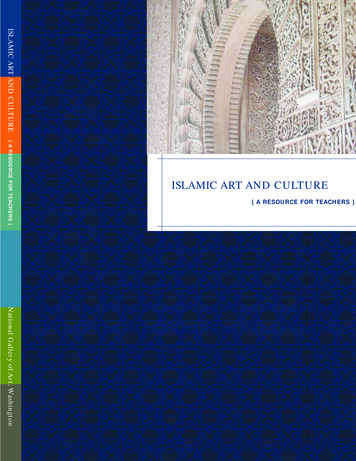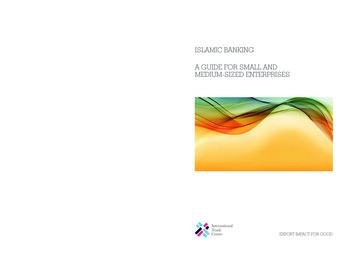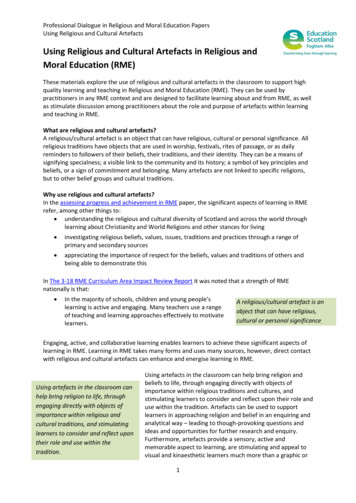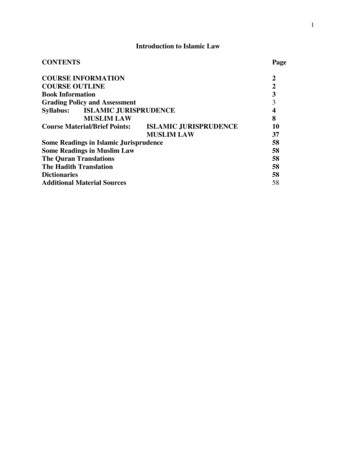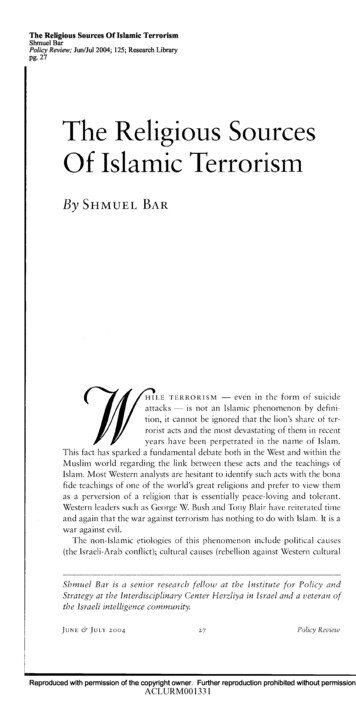
Transcription
The Religious Sources Of Islamic TerrorismShmuel BarPolicy Review; Jun/Jul 2004; 125; Research Librarypg. 27The Religious SourcesOf Islamic TerrorismBy SHMUEL BAR(IHUE TERRORISM — even in the form of suicideattacks -- is not an Islamic phenomenon by definition, it cannot be ignored that the lion's share of terrorist acts and the most devastating of them in recentyears have been perpetrated in the name of Islam.This fact has sparked a fundamental debate both in the West and within theMuslim world regarding the link between these acts and the teachings ofIslam. Most Western analysts are hesitant to identify such acts with the bonafide teachings of one of the world's great religions and prefer to view themas a perversion of a religion that is essentially peace-loving and tolerant.Western leaders such as George W Bush and Tony Blair have reiterated timeand again that the war against terrorism has nothing to do with Islam. It is awar against evil.The non-Islamic etiologies of this phenomenon include political causes(the Israeli-Arab conflict); cultural causes (rebellion against Western culturalShmuel Bar is a senior research fellow at the Institute for Policy andStrategy at the Interdisciplinary Center Herzliya in Israel and a veteran ofthe Israeli intelligence community.JUNE & JULY 200427Policy ReviewReproduced with permission of the copyright owner. Further reproduction prohibited without permissionACLURM001331
Shmuel Barcolonialism); arid social causes (alienation, poverty). While no public figurein the West would deny the imperative of fighting the war against terrorism,it is equally politically correct to add the codicil that, for the war to be won,these (justified) grievances pertaining to the root causes of terrorism shouldbe addressed. A skeptic may note that many societies can put claim to similar grievances but have not given birth to religious-based ideologies that justify no-holds-barred terrorism. Nevertheless an interpretation which placesthe blame for terrorism on religious and cultural traits runs the risk of beingbranded as bigoted and Islamophobic.The political motivation of the leaders of Islamist jihadist-type movementsis not in doubt. A glance at the theatres where such movements flourishedshows that most fed off their political — and usually military — encounterwith the West. This was the case in India and in the Sudan in the nineteenthcentury and in Egypt and Palestine in the twentieth. The moral justificationand levers of power for these movements, however, were for the most partnot couched in political terms, but based on Islamic religious sources ofauthority and religious principles. By using these levers and appealing todeeply ingrained religious beliefs, the radical leaders succeed in motivatingthe Islamist terrorist, creating for him a social environment that providesapprobation and a religious environment that provides moral and legal sanction for his actions. The success of radical Islamic organizations in therecruitment, posting, and ideological maintenance of sleeper activists (the9-I I terrorists are a prime example) without their defecting or succumbingto the lure of Western civilization proves the deep ideological nature of thephenomenon.Therefore, to treat Islamic terrorism as the consequence of political andsocioeconomic factors alone would not do justice to the significance of thereligious culture in which this phenomenon is rooted and nurtured. In orderto comprehend the motivation for these acts and to draw up an effectivestrategy for a war against terrorism, it is necessary to understand the religious-ideological factors — which are deeply embedded in Islam.The Weltanschauung of radical IslamIslamist terrorism is a natural offshoot of twentieth-century Islamic fundamentalism. The"Islamic Movement" emerged in the Arab world and Britishruled India as a response to the dismal state of Muslim society in thosecountries: social injustice, rejection of traditional mores, acceptance of foreign domination and culture. It perceives the malaise of modern Muslimsocieties as having strayed from the "straight path" (as-sirat al-mustaqim)and the solution to all ills in a return to the original mores of Islam. Theproblems addressed may be social or political: inequality, corruption, andoppression. But in traditional Islam — and certainly in the worldview of theODERN INTERNATIONAL2.8Policy ReviewReproduced with permission of the copyright owner. Further reproduction prohibited without permissionACLURM001332
The Religious Sources of Islamic TerrorismIslamic fundamentalist -- there is no separation between the political andthe religious. Islam is, in essence, both religion and regime (din wa-dawla)and no area of human activity is outside its remit. Be the nature of the problem as it may, "Islam is the solution."The underlying element in the radical Islamist worldview is ahistoric anddichotomist: Perfection lies in the ways of the Prophet and the events of histime; therefore, religious innovations, philosophical relativism, and intellectual or political pluralism are anathema. In such a worldview, there can existonly two camps — Dar al-Islam ("The House of Islam" — i.e., the Muslimcountries) and Dar al-Harp ("The House of War" — i.e., countries ruled byany regime but Islam) — which are pitted against each other until the finalvictory of Islam. These concepts are carried to their extreme conclusion bythe radicals; however, they have deep roots in mainstream Islam.While the trigger for "Islamic awakening" was frequently the meetingwith the West, Islamic-motivated rebellions against colonial powers rarelyinvolved individuals from other Muslim countries or broke out of the confines of the territories over which they were fighting. Until the t. 9 8os, mostfundamentalist movements such as the Muslim Brotherhood (IkhwanMuslimun) were inward-looking; Western superiority was viewed as theresult of Muslims having forsaken the teachings of the Prophet. Therefore,the remedy was, first, "re-Islamization" of Muslim society and restoration ofan Islamic government, based on Islamic law (shari'ah). In this context,jihad was aimed mainly against "apostate" Muslim governments and societies, while the historic offensive jihad of the Muslim world against the infidels was put in abeyance (at least until the restoration of the caliphate).Until the 19 8os, attempts to mobilize Muslims all over the world for ajihad in one area of the world (Palestine, Kashmir) were unsuccessful. TheSoviet invasion of Afghanistan was a watershed event, as it revived the concept of participation in jihad to evict an "infidel" occupier from a Muslimcountry as a "personal duty" (lard 'ein) for every capable Muslim. The basisof this duty derives from the "irreversibility" of Islamic identity both forindividual Muslims (thus, capital punishment for "apostates" —Salman Rushdie) and for Muslim territories. Therefore, any land(Afghanistan, Palestine, Kashmir, Chechnya, Spain) that had once beenunder the sway of Islamic law may not revert to control by any other law. Insuch a case, it becomes the "personal duty" of all Muslims in the land tofight a jihad to liberate it.l If they do not succeed, it becomes incumbent onI "If the disbelievers occupy a territory belonging to the Meshing it is incumbent upon the Muslims todrive them out, and to restore the land back to themselves; Spain bad been a Muslim territory for morethan eight hundred years, before it was captured by the Christians. they Ii.e., the Christians literally, andpractically wiped out the whole Muslim population. And 1101.4, it is our duty to restore Muslim rule tothis land of ours. The whole of India, including Kashmir, Hyderabad, Assam, Nepal, Burma, Behar, andjunagadh was once a Muslim territory. But we lost this vast territory, and it fell into the hands of the disbelievers simply because we abandoned jihad. And Palestine, as is well-known, is currently under theoccupation of the Jews. Even our First Qibla, Bait-ul-Mugaddas is under their illegal possession."— Jihaael ul-Kuffaari coal-Munaafigeen.NNE 6- JULY 2.00429Reproduced with permission of the copyright owner. Further reproduction prohibited without permission.ACLURM001333
Shmuel Barany Muslim in a certain perimeter from that land to join the jihad and soforth. Accordingly, given the number of Muslim lands under "infidel occupation" and the length of time of those occupations, it is argued that it hasbecome a personal duty for all Muslims to join the jihad. This duty — iftaken seriously — is no less a religious imperative than the other five pillarsof Islam (the statement of belief or shahadah, prayer, fasting, charity, andhaj). It becomes a de facto (and in the eyes of some a de jure) sixth pillar; aMuslim who does not perform it will inherit hell.Such a philosophy attributing centrality to the duty of jihad is not aninnovation of modern radical Islam. The seventh-century Kharijite sect, infamous in Islamic history as a cause of Muslim civil war, took this positionand implemented it. But the Kharijite doctrine wasrejected as a heresy by medieval Islam. The noveltyThe centrality is the tacit acceptance by mainstream Islam of thebasic building blocks of this "nco-Kharijite" school.of the dutyThe Soviet defeat in Afghanistan and the subsequent fall of the Soviet Union were perceived as anof jihad iseschatological sign, adumbrating the renewal of thejihad against the infidel world at large and the apocnot analyptical war between Islam and heresy which willinnovationresult in the rule of Islam in the world. Along withthe renewal of the jihad, the Islamistof modernWeltanschauung, which emerged from the Afghaniradical Islam. crucible, developed a Thanatophi le ideology2 inwhich death is idealized as a desired goal and not anecessary evil in war.An offshoot of this philosophy poses a dilemma for theories of deterrence.The Islamic traditions of war allow the Muslim forces to retreat if theirnumerical strength is less than half that of the enemy. Other traditions gofurther and allow retreat only in the face of a tenfold superiority of theenemy. The reasoning is that the act of jihad is, by definition, an act of faithin Allah. By fighting a weaker or equal enemy, the Muslim is relying on hisown strength and not on Allah; by entering the fray against all odds, themujahed is proving his utter faith in Allah and will be rewarded accordingly.The politics of Islamist radicalism has also bred a mentality of hello ergosum (I fight, therefore I exist) — Islamic leaders are in constant need of popular jihads to boost their leadership status. Nothing succeeds like success:The attacks in the United States gave birth to a second wave of mujahidinwho want to emulate their heroes. The perception of resolve on the part ofthe West is a critical factor in shaping the mood of the Muslim populationtoward radical ideas. Therefore, the manner by which the United States2 This is characterized by the emphasis on verses in the Koran and stories extolling martyrdom ("Why doyou cling to this world when the next world is better?") and praising the virtues of paradise as a real andeven sensual existence.30Policy ReviewReproduced with permission of the copyright owner. Further reproduction prohibited without permissionACLURM001334
The Religious Sources of Islamic Terrorismdeals with the present crisis in Iraq is not unconnected to the future of theradical Islamic movement. In these circles, the American occupation of Iraqis likened to the Soviet invasion of Afghanistan; a sense of American failurewould feed the apocalyptical ideology of jihad.The legality of jihad7". .-'1ESE BELIEFS A RE commonly viewed as typical of radical Islamicideology, but few orthodox Islamic scholars would deny that theyare deeply rooted in orthodox Islam or would dismiss the very ideology of jihad as a military struggle as foreign to the basic tenets of -Islam.Hence, much of the debate between radicals and nonradicals is not overthe religious principles themselves, but over their implication for actualbehavior as based on the detailed legal interpretation of those principles.This legal interpretation is the soul of the debate. Even among moderateIslamic scholars who condemn acts of terrorism (albeit with reservation soas not to include acts perpetrated against Israel in such a category), there isno agreement on why they should be condemned: Many modernistsacknowledge the existence of a duty of jihad in Islam but call for an "IslamicProtestantism" that would divest Islam of vestiges of anachronistic beliefs;conservative moderates find in traditional Islamic jurisprudence (shari'ah)legal justification to put the imperative of jihad in abeyance; others use linguistic analysis to point out that the etymology of the word jihad (jahada)actually means "to strive," does not mean "holy war," and does not necessarily have a military connotation.-;The legalistic approach is not a barren preoccupation of scholars. Theideal Islamic regime is a nomocracy: The law is given and immutable, and itremains for the leaders of the ummah (the Islamic nation) to apply it on aday-to-day basis. Islam is not indifferent to any facet of human behavior; allpossible acts potentially have a religious standing, ranging between "duty"„(lard, pl. fara'id); "recommended" (mandub); "optional" (jaiz); "permitted(mubah); "reprehensible” (makruh); and "forbidden" (harain). This taxonomy of human behavior has far-reaching importance for the believer: By performing all his religious duties, he will inherit paradise; by failing to do so("sins of omission") or doing that which is forbidden ("sins of commission"), he will be condemned to hell. Therefore, such issues as the legitimacyof jihadostensibly deriving from the roots of Islamcannot be decidedorbypolitics,butbymeticulouslegalanalysis and nilby abstract morality43 This is a rather specious argument. In all occurrences of the concept in traditional Islamic texts — andmore significantly in the accepted meaning for the great- majority of modern Muslims — the term means adivinely- ordained war.4 A frequently quoted verse "proving" the inadequacy of human conscience in regard to nuttier; of jihadis Korani 6: "Fighting is ordered for you even though you dislike it and it may he that you dislike athing that is good for you and like thing that is had for yon. Allah knows but yon do not know."2:2JUNE & JULYit2004jtReproduced with permission of the copyright owner. Further reproduction prohibited without permissionACLURM001335
Shrnuel Baring (fatwa) according to the shari'ah, performed by an authoritative Islamicscholar ('alum, pl. 'ulama).The use of fatwas to call for violent action first became known in theWest as a result of Ayatollah Khomeini's fatwa against Salman Rushdie, andagain after Osama bin Laden's 1998 fatwa against the United States andIsrael. But as a genuine instrument of religious deliberation, it has notreceived the attention it deserves. Analysts have frequently interpreted fatwas as no more than the cynical use of religious terminology in political propaganda. This interpretation does not do justice to the painstaking processof legal reasoning invested in these documents and the importance that theirauthors and their target audience genuinely accord to the religious truthfulness of their rulings.The political strength of these fatwas has been time-tested in Muslimpolitical society by rebels and insurgents from the Arabian peninsula toSudan, India, and Indonesia. At the same time, they have been used byMuslim regimes to bolster their Islamic credentials against external anddomestic enemies and to legitimize their policies. This was done by theSudanese mandi in his rebellion against the British ("88 I -85); by theOttoman caliphate (December 1914) in World War I; by the Syrian regimeagainst the rebellion in northern Syria ("98 ); and, mutatis mutandis, byEgyptian President Anwar Sadat to legitimize his peace policies towardIsrael.The fatwas promulgated by sheikhs and 'ulama who stipulate that jihad isa "personal duty" play, therefore, a pivotal role in encouraging radicalismand in building the support infrastructure for radicals within the traditionalIslamic community. While one may find many fatwas which advocate various manifestations of terrorism, fatwas which rule that those who performthese acts do not go to paradise but inherit hell are few and far between.The questions relating to jihad which arc referred to the religiousscholars5 relate to a number of issues:The very definition, current existence, and area of application of the stateof jihad. Is jihad one of the "pillars" (arkan) or "roots" (usul) of Islam?Does it necessarily imply military war or can it be perceived as a duty tospread Islam through preaching or even the moral struggle between one'ssoul and Satan?6 if the former, then what are the necessary conditions forjihad? Does a state of jihad currently exist between Dar al-Islam and Dar alHarh? And how can one define Dar al-Islam today, in the absence of a'sThe following list of questions has been gleaned from a large corpus of fatwas collected by the authorover recent years. 'the fatwas represent the questions of lay Muslims and responses of scholars from different countries. Some of the fatwas were written and published in mosques, others in the open press, andothers in dedicated sites on the inierneL. This claim, a favorite of modernists and moderates, comes from a unique and unconfirmed hadithwhich states: "The Prophet returned from one of his battles, and thereupon told us, 'You have arrivedwith an excellent arrival, you have come from the Lesser jihad to the Greater jihad — the striving of aservant lof Allah! against his desires."3 2.Policy ReviewReproduced with permission of the copyright owner. Further reproduction prohibited without permissionACLURM001336
The Religious Sources of Islamic Terrorismcaliphate? Is the rest of the world automatically defined as Dar al-Harb withwhich a state of jihad exists, or do the treaties and diplomatic relationswhich exist between Muslim countries and "infidel" countries (including thecharter of the United Nations) change this?'Who must participate in jihad, and how? Is jihad a personal duty (lard'ein) for each and every Muslim under all circumstances or a collective duty(fard kiffaya) that can be performed only under the leadership of a leader ofall Muslims (imam, khalifa, anur al-inu'aminin)? Is it incumbent on women?On minors? (According to Islamic law, in the case of a defensive jihad forthe liberation of Islamic territory from infidel occupation, "a woman neednot ask permission of her husband nor a child of his parents nor a slave ofhis master.") May a Muslim refrain from supporting his attacked brethrenor obey a non-Muslim secular law which prohibits him from supportingother Muslims in their struggle?How should the jihad be fought (jus in helium)? The questions in thisarea relate, inter alia, to: (A) Is jihad by definition an act of conflict againstthe actual "infidels" or can it be defined as a spiritual struggle against the"evil inclination"? If it is the former, must it take the form of war (jihad fisabil Allah) or can it be performed by way of preaching and proselytization(da'awah)? (11) Who is a legitimate target? Is it permissible to kill noncombatant civilianswomen, children, elderly, and clerics; "protected" nonMuslims in Muslim countries -- local non-Muslims or tourists whose visasmay be interpreted as Islamic guarantees of passage (al/1(m); Muslimbystanders? (c) The legitimacy of suicide attacks (istishhad) as a form ofjihad in the light of the severe prohibition on a Muslim taking his own life,on one hand, and the promise of rewards in the afterlife for the shahid whofalls in a jihad on the other hand!' (n) The weapons which may be used. Forexample, may a hijacked plane be used as a weapon as in the attacks ofSeptember t i in the light of Islamic prohibitions on killing prisoners?(e) The status of a Muslim who aids the "infidels" against other Muslims.(n) The authority to implement capital punishment in the absence of acaliph.How should jihad be funded? "Pocketbook jihad" is deeply entrenched inIslamic tradition. It is based on the injunction that one must fight jihad withhis soul or with his tongue (jihad ahlissan or da'awah) or with his money(jihad fi-mal). Therefore, financial support of jihad is politically correct and7Some Islamic judicial schools add to the Dar al-I slamll)ae al-11arb dichotomy a third category: Dar al'Ahad, countries which have peace treaties with Muslims and therefore arc not to be attacked. The basisfor discerning whether or not a country belongs to Dar al-Islam is not agreed upon. Some scholars claimthat as long as a Muslim can practice his faith openly, the country is not !Jaihub.8 1t should he nutted that in the historic paradigms of "suicide" terror, which are used us authority for justification of such attacks, the Martyr did nor kill himself but rather placed himself in a situation in whichhe would most likely be killed. Technically, therefore, he did not violate the Koranic prohibition on aMuslim taking his owntargets of the suicide terrorist of ancient nines were also quite different— officials of the ruling class and armed (Muslim) enemies. The modern paradigm of suicide bombingcalled for renewed consideration of this aspect.JUN E & lL1I.Y 2.004Reproduced with permission of the copyright owner. Further reproduction prohibited without permissionACLURM001337
Shinuel Bareven good for business for the wealthy supporter. The transfer of zakat(almsgiving) raised in a community for jihad ft-sabil Allah (i.e., jihad onAllah's path or military jihad) has wide religious and social legitimacy.9 Theprecepts of "war booty" (ghaneema or tdy') call for a fifth (khoms) to berendered to the mujahidin. Acts that would otherwise be considered religiously prohibited are thus legitimized by the payment of such a "tax" forthe sake of jihad. While there have been attempts to bring Muslim clerics todenounce acts of terrorism, none, to date, have condemned the donation ofmoney for jihad.The dilemma of the moderate Muslimon safely assumed that the great majority of Muslims in theworld have no desire to join a jihad or to politicize their religion.However, it is also true that insofar as religious establishments inmost of the Arabian peninsula, in Iran, and in much of Egypt and NorthAfrica are concerned, the radical ideology does not represent a marginal andextremist perversion of Islam but rather a genuine and increasingly mainstream interpretation. Even after 9-i 1, the sermons broadcast from Meccacannot be easily distinguished froth those of al Qacda.Facing the radical Weltanschauung, the moderate but orthodox Muslimhas to grapple with two main dilemmas: the difficulty of refuting the legalreligious arguments of the radical interpretation and the aversion to — oreven prohibition of — inciting an Islamic Kulturkampf which would splitthe ranks of the ununah.The first dilemma is not uniquely Islamic. It is characteristic of revelationbased religions that the less observant or less orthodox will hesitate to challenge fundamental dogmas out of fear of being branded slack or lapsed intheir faith. They will prefer to pay their dues to the religious establishment,hoping that by doing so they are also buying their own freedom from coercion. On a deeper level, many believers who arc not strict in observance maysee their own lifestyle as a matter of convenience and not principle, while theextreme orthodox is the true believer to whom they defer.This phenomenon is compounded in Islam by the fact that "Arab" SunniIslam never went though a reform.m Since the tenth century, Islam haslacked an accepted mechanism for relegating a tenet or text to ideologicalobsolescence. Until that time, such a mechanism — ijtihad — existed; ijtihadCANprominent- fundamentalist Sheikh Yusuf al-Qaradawi, for example, gave a //diva obliging Muslimslund jihad out of money collected For charity ('aka[). I,taftuvi from April i i , 2002 in Islamonline.)I True, religions are naturally conservative and slow to change. Religious reforms are born and legitimized through the authority of a supreme spiritual leader (a pope or imam), an accepted mechanism ofscholarly consensus (LthIllid, the ii//7(C 01 the schools of Orisprudence in early Islam), internal revolution(Protestantism), or external force (the destruction of the Second Ilianple in Judaism). Islam canonizeditself in the tenth century and therelore did not go through any of these "reforms."Policy ReviewReproduced with permission of the copyright owner. Further reproduction prohibited without permissionACLURM001338
The Religious Sources of Islamic Terrorismis the authorization of scholars to reach conclusions not only from existinginterpretations and legal precedents, but from their own perusal of the texts.In the tenth century, the "gates of litihad" were closed for most of the Sunniworld. It is still practiced in Shiite Islam and in Southeast Asia. Reformisttraditions did appear in non-Arab Middle Eastern Muslim societies (Turkey,Iran) and in Southeast Asian Islam. Many Sufi (mystical) schools also havetraditions of syncretism, reformism, and moderation. These traditions, however, have always suffered from a lack of wide legitimacy due to their nonArab origins and have never been able to offer themselves as an acceptablealternative to ideologies born in the heartland of Islam and expressed in thetongue of the Prophet. In recent years, these societies have undergone atransformation and have adopted much of the Middle Eastern brand ofIslamic orthodoxy and have become, therefore, more susceptible to radicalideologies under the influence of Wahhabi missionaries, Iranian export ofIslam, and the cross-pollination resulting from the globalization of ideas inthe information age.The second dilemma — the disinclination of moderates to confront theradicalshas frequently been attributed to violent intimidation (which, nodoubt, exists), but it has an additional religious dimension. While the radicalsare not averse to branding their adversaries as apostates, orthodox and moderate Muslims rarely resort to this weapon. Such an act (takfir --- accusinganother Muslim of heresy [kufrj by falsifying the roots of Islam, allowing thatwhich is prohibited or forbidding that which is allowed) is not to be takenlightly; it contradicts the deep-rooted value that Islam places on unity amongthe believers and its aversion to fitna (communal discord). It is ironic that areligious mechanism which seems to have been created as a tool to preservepluralism and prevent internal debates from deteriorating into civil war andmutual accusations of heresy (as occurred in Christian Europe) has become atool in the hands of the radicals to drown out any criticism of them.Consequently, even when pressure is put on Muslim communities, thereexists a political asymmetry in favor of the radicals. Moderates are reluctantto come forward and to risk being accused of apostasy. For this very reason,many Muslim regimes in the Middle East and Asia are reluctant to crackdown on the religious aspects of radical Islam and satisfy themselves withdealing with the political violence alone. By way of appeasement politics,they trade tolerance of jihad elsewhere for local calm. Thus, they loseground to radicals in their societies.The Western dilemmain politically oriented Western society to assume thatthere is a rational pragmatic cause for acts of terrorism and that if thepolitical grievance is addressed properly, the phenomenon will fade.However, when the roots are not political, it is naive to expect political gesT IS A TENDENCYJuNE jinx 200435Reproduced with permission of the copyright owner. Further reproduction prohibited without permissionACLURM001339
Shrnuel Bartures to change the hearts of radicals. Attempts to deal with the terrorist threatas if it were divorced from its intellectual, cultural, and religious fountainheadsare doomed to failure. Counterterrorism begins on the religious-ideologicallevel and must adopt appropriate methods. The cultural and religious sourcesof radical Islamic ideology must be addressed in order to develop a long-rangestrategy for coping with the terrorist threat to which they give birth.However; in addressing this phenomenon, the West is at a severe disadvantage. Western concepts of civil rights along with legal, political, and cultural constraints preclude government intervention in the internal matters oforganized religions; they make it difficult to prohibit or punish inflammatory sermons of imams in mosques (as Muslim regimes used to do on a regularbasis) or to punish clerics for fatwas justifying terrorism. Furthermore, thelegacy of colonialism deters Western governments from taking steps thatmay be construed as anti-Muslim or as signs of lingering colonialist ideology. This exposes the Western country combating the terrorist threat to criticism from within. Even most of the new and stringent terrorism preventionlegislation that has been enacted in some counties leans mainly on investigatory powers (such as allowing for unlimited administrative arrests, etc.) anddoes not deal with prohibition of religion-based "ideological crimes" (asopposed to anti-Nazi and anti-racism laws, which are in force in manycountries in Europe).The regimes of the Middle East have proven their mettle in coercing religious establishments and even radical sheikhs to rule in a way commensurate with their interests. However, most of them show no inclination to joina global (i.e., "infidel") war against radical Islamic ideology. Hence, theprospect of enlisting Middle Eastern allies in the struggle against Islamic radicalism is bleak. Under these conditions, it will be difficult to curb the conversion of young Muslims in the West to the ideas of radicalism emanatingfrom the safe hou
The moral justification and levers of power for these movements, however, were for the most part not couched in political terms, but based on Islamic religious sources of authority and religious principles. By using these levers and appealing to . 2This is characterized by the emphasis on verses in the K
